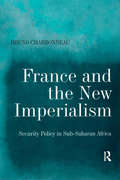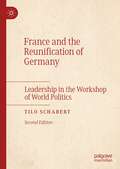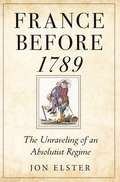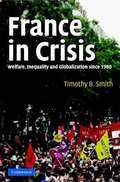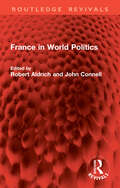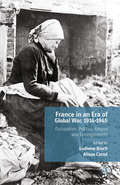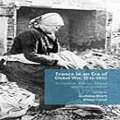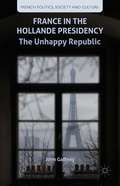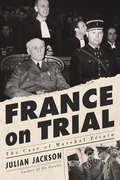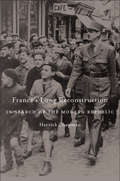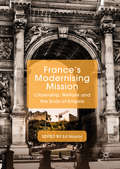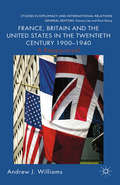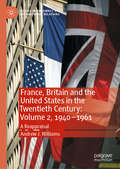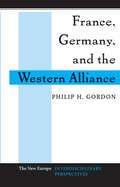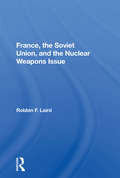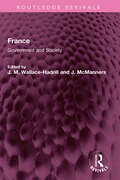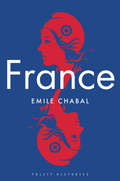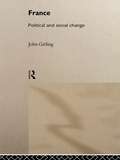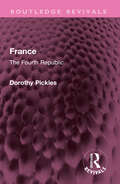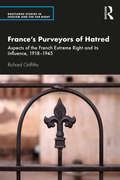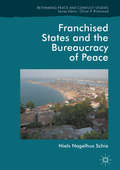- Table View
- List View
France and the New Imperialism: Security Policy in Sub-Saharan Africa
by Bruno CharbonneauThe role of French security policy and cooperation in Africa has long been recognized as a critically important factor in African politics and international relations. The newest form of security cooperation, a trend which merges security and development and which is actively promoted by other major Western powers, adds to our understanding of this broader trend in African relations with the industrialized North. This book investigates whether French involvement in Africa is really in the interest of Africans, or whether French intervention continues to deny African political freedom and to sustain their current social, economic and political conditions. It illustrates how policies portrayed as promoting stability and development can in fact be factors of instability and reproductive mechanisms of systems of dependency, domination and subordination. Providing complex ideas in a clear and pointed manner, France and the New Imperialism is a sophisticated understanding of critical security studies.
France and the Reunification of Germany: Leadership in the Workshop of World Politics
by Tilo SchabertWith the collapse of the Soviet Union and its Eastern European bloc, the reunification of Germany was a major episode in the history of modern Europe — and one widely held to have been opposed by that country's centuries-old enemy, France. But while it has been previously believed that French President François Mitterrand played a negative role in events leading up to reunification, this book shows that Mitterrand's main concern was not the potential threat of an old nemesis but rather that a reunified Germany be firmly anchored in a unified Europe. Updated with a new introduction and other materials, the book blends primary research and interviews with key actors in France and Germany to take readers behind the scenes of world governments as a new Europe was formed. Tilo Schabert had unprecedented, exclusive access to French presidential archives and here focuses on French diplomacy not only to dispel the notion that Mitterrand was reluctant to accept reunification but also to show how successful he was in bringing it about.
France before 1789: The Unraveling of an Absolutist Regime
by Jon ElsterA masterful new account of old regime France by one of the world's most prominent political philosophersFrance before 1789 traces the historical origins of France's National Constituent Assembly of 1789, providing a vivid portrait of the ancien régime and its complex social system in the decades before the French Revolution. Jon Elster writes in the spirit of Alexis de Tocqueville, who described this tumultuous era with an eye toward individual and group psychology and the functioning of institutions. Whereas Tocqueville saw the old regime as a breeding ground for revolution, Elster, more specifically, identifies the rural and urban conflicts that fueled the constitution-making process from 1789 to 1791. He presents a new approach to history writing, one that supplements the historian's craft with the tools and insights of modern social science. Elster draws on important French and Anglo-American scholarship as well as a treasure trove of historical evidence from the period, such as the Memoirs of Saint-Simon, the letters of Madame de Sévigné, the journals of the lawyer Barbier and the bookseller Hardy, the Remonstrances of Malesherbes, and La Bruyère's maxims.Masterfully written and unparalleled in scope, France before 1789 is the first volume of a trilogy that promises to transform our understanding of constitution making in the eighteenth century. Volume 2 will look at revolutionary America in the years leading up to the Constitutional Convention of 1787 while the third volume will examine all facets of the French and American assemblies, from how they elected their delegates and organized their proceedings to how they addressed issues of separation of powers and representation.
France in Crisis: Welfare, Inequality, and Globalization Since 1980
by Timothy B. SmithTimothy Smith argues that the French economic and social model is imploding on itself despite good intentions.
France in World Politics (Routledge Revivals)
by Robert Aldrich John ConnellOriginally published in 1989, this book analyses France’s distinctive role in international affairs and examines the characteristics of French foreign policy in the Fifth Republic. The introduction provides an overview of France’s role in international relations, then specific chapters look at topics such as French military strategy and relations with the superpowers of the late 20th Century; France and the European Community; immigrant workers and their impact on France’s international presence and France & Africa, among others. The final chapter discusses the evolution and formulation of French foreign policy in historical perspective. The contributors were historians, geographers and specialists in French civilization, all with experience in France. Each chapter includes notes and references to work in both English and French, making the book an important source, especially for students of politics, international relations, modern history and French studies
France in an Era of Global War, 1914-1945: Occupation, Politics, Empire and Entanglements
by A. Carrol L. BrochIn France in an Era of Global War, scholars re-examine experiences of French politics, occupation, empire and entanglements with the Anglophone world between 1914 and 1945. In doing so, they question the long-standing myths and assumptions which continue to surround this period, and offer new avenues of enquiry.
France in an Era of Global War, 1914–1945
by Ludivine BrochIn France in an Era of Global War, scholars re-examine experiences of French politics, occupation, empire and entanglements with the Anglophone world between 1914 and 1945. In doing so, they question the long-standing myths and assumptions which continue to surround this period, and offer new avenues of enquiry.
France in the Enlightenment
by Arthur Goldhammer Daniel RocheA panorama of a whole civilization, a world on the verge of cataclysm, unfolds in this work by Daniel Roche. The text brings the Old Regime to life by showing how its institutions operated and how they were understood by the people who worked within them.
France in the Hollande Presidency
by John GaffneyThrough an analysis of the first half of Fran#65533;ois Hollande's five-year presidential term, this study examines the strengths and weaknesses of presidential politics following the Left's return to power in 2012 and puts forward an interpretation of the underlying nature of contemporary French politics, and the Fifth Republic itself. The analysis demonstrates that the Fifth Republic is dysfunctional, because of the manner in which political observers and actors have understood or failed to understand this singular republic and its performative requirements. The book examines how Fran#65533;ois Hollande, as President, acted 'out of category', and what the first half of the five-year term – up until the creation of the Valls government, the European Elections, the publication of Val#65533;rie Trierweiler's book in 2014, and the return to frontline politics of Nicolas Sarkozy – tells us about the nature of the Fifth Republic.
France on Trial: The Case of Marshal Pétain
by Julian JacksonFor three weeks in July 1945 all eyes were fixed on a humid Paris, where France’s disgraced former head of state was on trial, accused of masterminding a plot to overthrow democracy. Would Philippe Pétain, hero of Verdun, be condemned as the traitor of Vichy?In the terrible month of October 1940, few things were more shocking than the sight of Marshal Philippe Pétain—supremely decorated hero of the First World War, now head of the French government—shaking hands with Hitler. Pausing to look at the cameras, Pétain announced that France would henceforth collaborate with Germany. “This is my policy,” he intoned. “My ministers are responsible to me. It is I alone who will be judged by History.”Five years later, in July 1945, after a wave of violent reprisals following the liberation of Paris, Pétain was put on trial for his conduct during the war. He stood accused of treason, charged with heading a conspiracy to destroy France’s democratic government and collaborating with Nazi Germany. The defense claimed he had sacrificed his personal honor to save France and insisted he had shielded the French people from the full scope of Nazi repression. Former resisters called for the death penalty, but many identified with this conservative military hero who had promised peace with dignity.The award-winning author of a landmark biography of Charles de Gaulle, Julian Jackson uses Pétain’s three-week trial as a lens through which to examine one of history’s great moral dilemmas. Was the policy of collaboration “four years to erase from our history,” as the prosecution claimed? Or was it, as conservative politicians insist to this day, a sacrifice that placed pragmatism above moral purity? As head of the Vichy regime, Pétain became the lightning rod for collective guilt and retribution. But he has also been an icon of the nationalist right ever since. In France on Trial, Jackson blends courtroom drama, political intrigue, and brilliant narrative history to highlight the hard choices and moral compromises leaders make in times of war.
France's Long Reconstruction: In Search of the Modern Republic
by Herrick ChapmanPostwar recovery required a transformation of France, but what form it should take remained a question. Herrick Chapman charts the course of France’s reconstruction from 1944 to 1962, offering insights into the ways the expansion of state power produced fierce controversies at home and unintended consequences abroad in France’s crumbling empire.
France's Modernising Mission
by Ed NaylorThis volume explores how France's 'modernising mission' unfolded during the post-war period and its reverberations in the decades after empire. In the aftermath of the Second World War, France sought to reinvent its empire by transforming the traditional 'civilising mission' into a 'modernising mission'. Henceforth, French claims to rule would be based on extending citizenship rights and the promise of economic development and welfare within a 'Greater France'. In the face of rising anti-colonial mobilization and a new international order, redefining the terms that bound colonised peoples and territories to the metropole was a strategic necessity but also a dynamic which Paris struggled to control. The language of reform and equality was seized upon locally to make claims on metropolitan resources and wrest away the political initiative. Intertwined with coercion and violence, the struggle to define what 'modernisation' would mean for colonised societies was a key factor in the wider process of decolonisation. Contributions by leading specialists extend geographically from Africa to the Pacific and to metropolitan France itself, examining a range of topics including education policy, colonial knowledge production, rural development and slum clearance.
France, Britain and the United States in the Twentieth Century 1900–1940
by Andrew J. WilliamsWhy is France so often relegated to the background in studies of international relations? This book seeks to redress this balance, exploring the relationship between the United States, United Kingdom and France, and its wider impact on the theory and practice of international relations.
France, Britain and the United States in the Twentieth Century: A Reappraisal (Studies in Diplomacy and International Relations)
by Andrew J. Williams"In his account of the relationship between France, the UK and the US Andrew Williams successfully intertwines diplomatic history with international thought. We are presented with a historical stage that includes both the doers and the thinkers of the age, and as a result this is a must read for both diplomatic historians and historians of international thought. The second in a multivolume study, this volume takes the story beyond the fall of France into the war years, the period of post-war reconstruction, and the Cold War. As with the first volume, Williams is an excellent guide, stepping over the ruins of past worlds, and introducing us to an epoch with more than its fair share of both visionaries and villains. Yet in this second volume the stakes are higher, as the United States comes to terms with its role as the paramount world power, Britain faces a world that challenges its imperial order, and France is picking up the pieces from its defeat."Lucian Ashworth, Memorial University, Canada"Following on from his outstanding first volume reviewing the complex interwar relationships between France, Britain and the United States, Williams’ second volume is an indispensable and lucid overview of the vitally important era of post-war reconstruction. From national post-war developments to institutional structures and superpower shifts, Williams examines clearly and engagingly the final passing of pre-modern power structures and the emergence of a new Europe."Amelia Hadfield, University of Surrey, UK"At a time of intense debates about Europe, the ‘Anglosphere’ and empires old and new, Andrew Williams’s book is a timely demonstration that the weight of emotion in the shaping of foreign policy and its makers should not be forgotten. Unearthing some of the ‘forces profondes’ in diplomacy and reflecting on feelings of humiliation and liberation in national constructs, Andrew Williams discusses the cultural conceptions and misconceptions that French, American and British diplomats had of each other, thereby revisiting the reasons why the ‘special relationship’ was largely a myth – but one which had tangible consequences on French and British policies in their retreat from empire. By connecting the personal and the national, the structural and accidental, Williams offers essential insights into the major conflicts of the period and their impact on diplomatic cultures across the Atlantic."Mélanie Torrent, Université Picardie Jules Verne, Amiens, FranceThe second volume of this study of France’s unique contribution to the international relations of the last century covers the period from the Fall of France in 1940 to Charles de Gaulle’s triumphant return to power in the late 1950s. France had gone from being a victorious member of the coalition with Britain and the United States that won the First World War to a defeated nation in a few short weeks. France then experienced the humiliation of collaboration with and occupation by the enemy, followed by resistance and liberation and a slow return to global influence over the next twenty years. This volume examines how these processes played out by concentrating on France’s relations with Britain and the United States, most importantly over questions of post-war order, the integration of Europe and the withdrawal from Empire.
France, Germany, and the Western Alliance (The New Europe: Interdisciplinary Perspectives)
by Philip H Gordon<p>Whether Europe will ever have anything resembling the “common foreign and security policy” described in the Maastricht Treaty will depend most of all on whether France and Germany are able to align their foreign policy goals and means. This thoughtful and original study examines the Franco-German security partnership in its post–Cold War context and analyzes the implications of that partnership for both Europe and the United States. Utilizing French and German sources and extensive interviews in Paris, Bonn, and Washington, Philip Gordon traces the evolution of Franco-German security cooperation since World War II, focusing especially on post-1989 developments. The book's historical and conceptual approach provides a framework for assessing the foundations of the Euro-optimism and -pessimism at odds with each other today. <p>Gordon argues that Franco-German cooperation in the post–Cold War era will be more challenging than it was during a time when the Soviet threat united the two countries in a U.S.-led alliance. The book demonstrates how the end of the Cold War, German unification, a declining U.S. role in Europe, and emerging instabilities to Europe's east and south will test the strength of the Franco-German partnership, and it examines how French and German leaders have stood up to the new challenges so far. Detailed case studies of the Persian Gulf War, the debates over the “Eurocorps,” policies toward Eastern Europe, and the war in Yugoslavia make an invaluable contribution to our understanding of French, German, and Alliance policies in the post–Cold War world. Gordon also identifies new trends in French and German security policies since 1989 and analyzes their effects on the potential for Western and European cohesion.The book concludes that the general commitment in Paris and Berlin to continued cooperation is not in doubt but that a truly common and effective Franco-German or European security policy is unlikely; the national interests of the two countries and their Western partners not only remain different, but they are probably more divergent today than during the Cold War. Consequently, Gordon also argues that U.S. and European fears of Franco-German bilateralism are exaggerated and indeed that the allies have more to gain than to lose from Franco-German cooperation. The problem for the West is not so much that France and Germany have formed a cohesive political-military force within Europe but that they have failed to do so.</p>
France, Mexico and Informal Empire in Latin America, 1820-1867: Equilibrium in the New World (Cambridge Imperial and Post-Colonial Studies Series)
by Edward ShawcrossThis book explores French imperialism in Latin America in the nineteenth century, taking Mexico as a case study. The standard narrative of nineteenth-century imperialism in Latin America is one of US expansion and British informal influence. However, it was France, not Britain, which made the most concerted effort to counter US power through Louis-Napoléon’s military intervention in Mexico, begun in 1862, which created an empire on the North American continent under the Habsburg Archduke Ferdinand Maximilian. Despite its significance to French and Latin American history, this French imperial project is invariably described as an “illusion”, an “adventure” or a “mirage”. This book challenges these conclusions and places the French intervention in Mexico within the context of informal empire. It analyses French and Mexican ideas about monarchy in Latin America; responses to US expansion and the development of anti-Americanism and pan-Latinism; the consolidation of Mexican conservatism; and, finally, the collaboration of some Mexican elites with French imperialism. An important dimension of the relationship between Mexico and France, explored in the book, is the transatlantic and transnational context in which it developed, where competing conceptions of Mexico and France as nations, the role of Europe and the United States in the Americas and the idea of Latin America itself were challenged and debated.
France, The Soviet Union, And The Nuclear Weapons Issue
by Robbin F LairdDr. Laird provides the student of Soviet affairs, international security, and arms control with an understanding of the role of the Soviets in European security by examining the Soviet-French interaction. He first defines the general Soviet approach to European security issues and discusses it with specific reference to France. He identifies contem
France: Government and Society (Routledge Revivals)
by J. M. Wallace-Hadrill J. McMannersFirst published in 1957, France is a collection of essays which was originally delivered as lectures in the University of Oxford. While there is an intense interest in French history, it is still true to say that no satisfactory short history of France is available to the English reader. A single writer, or, indeed, a group of two or three writers could not hope to master the state of studies over the whole range of French history; this could only be done by a team of experts, and such a team of experts could only be found in one of our major universities. The volume which is here presented consists of twelve essays by recognized experts in particular fields, each essay being complete in itself, while together they cover the interaction of government and society over the whole range of French history from the earliest times to the 1950s. This book will be of interest to students of politics, government, history, sociology, and policy.
France: History, Politics And Memory In An Age Of Uncertainty (Polity Histories)
by Emile ChabalFrance is the most-visited country in the world. It attracts millions of tourists, most of whom come in search of beautiful architecture, good food, and fine art. But appearances can be deceptive. France is not only a place of culture and glamour; it also carries the bitter memories of violence, division and broken promises.In this arresting book, Emile Chabal, a leading specialist of contemporary France, tells the story of a paradoxical country. From the calamitous defeat by Hitler's armies in 1940 to the spectacular gilets jaunes protests, he explores the contradictions that have shaped French history over the last eighty years. The picture that emerges is one of a nation struggling to reconcile its core political values with the realities of a diverse society.Listen to the author talk about the book with Roxanne Panchasi on the New Books Network Podcast
France: Political and Social Change
by John GirlingFirst published in 1998. Routledge is an imprint of Taylor & Francis, an informa company.
France: Selected Issues
by International Monetary FundA report from the International Monetary Fund.
France: Selected Issues
by International Monetary FundA report from the International Monetary Fund.
France: The Fourth Republic (Routledge Revivals)
by Dorothy PicklesFirst published in 1955 France: The Fourth Republic is the first book to provide an account of the working constitution of the Fourth French Republic. It summarises the innovations introduced by the 1946 constitution, comments on its working and on the revisions, describes how the French Parliament functions, the organisation of local government, and the new constitutional provisions governing the relations between France and her overseas territories. It also describes the outlook and organisation of the political parties and trade unions. It attempts to capture the institutional background to French politics, post war problems, fundamental characteristics of French political life, permanent attitudes of French politicians, and shifting moods of public opinion. This is an essential read for students and scholars of French politics, political history, European politics, and international relations.
France’s Purveyors of Hatred: Aspects of the French Extreme Right and its Influence, 1918–1945 (Routledge Studies in Fascism and the Far Right)
by Richard GriffithsThis book examines the extreme right in France during the interwar period. It begins by describing the background of the French right before 1914 and then provides commentary and analysis of the broad range of the extra-parliamentary right in interwar France. Organisations such as Action Française and the militant ligues are examined as well as prominent extreme-right intellectuals such as Lucien Rebatet, Robert Brasillach and Pierre Drieu la Rochelle. The various forms of French anti-Semitism are assessed, and the book also situates the French extreme right within a broader context by assessing its impact on other European countries, including the UK. It concludes by exploring the complicated politics of wartime France where some extreme-right activists collaborated with the Nazis while others opposed them, and where few generalisations prove possible. This volume will be of great interest to scholars and students of French history, the extreme right and interwar politics.
Franchised States and the Bureaucracy of Peace (Rethinking Peace and Conflict Studies)
by Niels Nagelhus SchiaThis book examines a new type of state formation evoked by the rise of transnational rule, what Schia calls franchised states. Drawing on anthropological studying-through fieldwork within the UN organization, he demonstrates how peacebuilding activities turned Liberia into an object of governing, whereby the UN, in seeking to build the state, also became the state. The sovereign state of Liberia here emerges as a franchise rather than a self-contained entity. Two implications follow: First, that international peacebuilding turns post-conflict countries into clients of the international community. Second, that "sovereignty" is no longer exclusively associated with the state: it is organized in and through specific practices of governing where a state actor is only one among a range of actors. With these findings, the book moves beyond previous work on peacebuilding by focusing on the unbundling of sovereignty. It contributes to the literature on the changing forms of sovereignty by showing the specific ways in which sovereignty is organized, packaged and enacted, often by actors working under international auspices. This book will be of interest to practitioners and students interested in international organizations, international relations, the study of international practices, UN, and peacebuilding.
